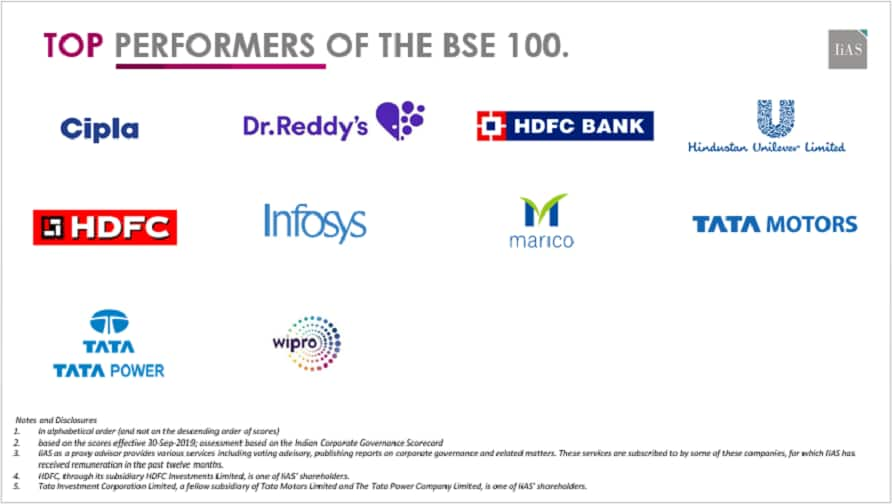



Companies with institutionalised governance practices were better able to withstand the onslaught of 2019. Both equity and debt markets were affected by governance issues in the year gone by, which is expected to renew focus on responsible investing, going forward.
For Corporate India, the past 12-18 months have been difficult. With economic growth slowing, achieving business targets has been stretching managements, with a few opting for short-term fixes.
The meltdown of two large non-banking financial companies (NBFCs) impacted the flow of funds. With stretched liquidity and a weakened real estate sector, the asset quality of several NBFCs came under scrutiny. One large NBFC was referred to the Insolvency and Bankruptcy Code (IBC) within a week of the code being notified for finance companies.
Divergences on asset quality recognition continued to plague the banking sector and the continued weakening of asset quality further deteriorated capital adequacy levels in what is now referred to as the twin balance sheet problem. The government merged several public sector banks in an attempt to create larger banks that can better serve a growing India Inc, but whether this creates stronger banks remains to be seen.
Meanwhile, the failure of two co-operative banks resulted in anxious deposit holders turning to the Reserve Bank of India (RBI) for help and brought to the forefront the debate on the extent of RBI’s oversight over the financial sector.
Developments over the past one year have demonstrated the impact of corporate governance practices on credit markets. The almost $20 billion of debt held in companies under the IBC (Insolvency and Bankruptcy Code), while being set to clear up, is lesson enough for credit markets on the importance of assessing not just credit ratios, but governance practices before they lend.
Other disruptions too affected bond holders during 2019. The big issue concerning the Indian credit markets was promoter shareholding being pledged to raise debt. Mutual funds that invested in loan-against-shares products in their Fixed Maturity Plan schemes rolled over the redemption on maturity date with the hope that a stake sale would result in the bonds being paid up.
This, even as promoters of one bank, media house and industrial solutions company lost control of their businesses because lenders called in the pledge and sold down the equity. Although SEBI (Securities and Exchange Board of India) introduced side-pocketing to deal with such instances and tightened disclosure requirements, this put focus on the governance practices of various investment institutions.
Whistle-blowers once again came to the fore in raising governance issues. While whistle-blower mechanisms in India work for the most part, today there seems to be a dangerous trend of whistle-blowers using media to get attention.
Even so, while whistle-blowers get protection under law, the use of media to raise questions on management has severe repercussions. In a regime where defamation laws are weak, an event of this nature is essentially out of boards’ control. Boards can only react, and not pre-empt this. Regulations must consider removing protection afforded to whistle-blowers that directly access media, a practice followed in other geographies.
All these issues tested the governance practices of Corporate India in 2019. Companies that had institutionalised their governance practices were better able to navigate the onslaught of the myriad issues.
In 2019, the Institutional Investor Advisory Services (IiAS) evaluated the governance practices of 150 companies — S&P BSE 100 index constituents (BSE 100) + 50 companies listed between April 2015 and March 2017 (IPO companies) — on the Indian Corporate Governance Scorecard framework. This scorecard has been developed jointly by International Finance Corporation (member of the World Bank Group), the BSE, and IiAS.
The 2019 study, titled ‘Stability despite headwinds’, showed that the larger companies have taken their governance practices seriously, resulting in median scores of Sensex constituents increasing to 61 from 60 in 2018. BSE 100 companies maintained median scores at 58.
Yet, at the higher end, the scores of most companies had increased, just as much as at the lower end, the scores had decreased over the previous year. The institutionalisation of governance practices led to greater stability of scores for the larger listed companies. IPO companies were not able to hold their ground – their median scores declined to 54 from 55 last year, with the lowest company scoring a mere 29.

The study shows that markets have rewarded the more stable and better governed companies. At a portfolio level, well-governed companies — those with a score of 60 per cent or more — outperformed the rest of the pool over a two and three years.
The analysis holds true for stock Beta too. Stock Beta signifies the volatility in stock price movement. Well-governed companies tend to, at a portfolio level, be less volatile than the residual pool of companies. This analysis is not a back-testing of current scores, but an assessment of companies scored in IiAS’ earlier studies. Therefore, the assessment on the Indian Corporate Governance Scorecard framework has predictive value.
At a company-specific level, there will be exceptions. Stock prices of well-governed companies may not outperform the index and vice-versa. Even so, at a portfolio level, the argument of a direct correlation between price performance and stock beta vis-à-vis corporate governance standards holds true.
Investors have a strong role to play in improving the corporate governance practices of companies. This is reflected in the correlation between institutional holding and governance scores: median shareholding of institutional investors is higher for BSE 100 companies at 34 per cent, compared to IPO companies at 24 per cent.
The year 2019 also witnessed an increase in investor engagement levels. With the growing number of issues that companies faced during the year, investors from both debt and equity sides increased their interaction with companies. Lenders took unique positions — some ruthlessly calling in pledges and selling down the equity, others taking on board seats and establishing control.
In one instance, lenders refused to accept the promoter’s resignation, ensuring that the promoter continues to shoulder the responsibility of finding a resolution for the company instead of walking away.
With both equity and credit markets being affected by corporate governance practices in 2019, responsible investing is likely to take the front seat in 2020.
Hetal Dalal works at Institutional Investor Advisory Services India Limited (IiAS). Twitter handle: @hetal_dalal. Views are personal.
Discover the latest Business News, Sensex, and Nifty updates. Obtain Personal Finance insights, tax queries, and expert opinions on Moneycontrol or download the Moneycontrol App to stay updated!
Find the best of Al News in one place, specially curated for you every weekend.
Stay on top of the latest tech trends and biggest startup news.